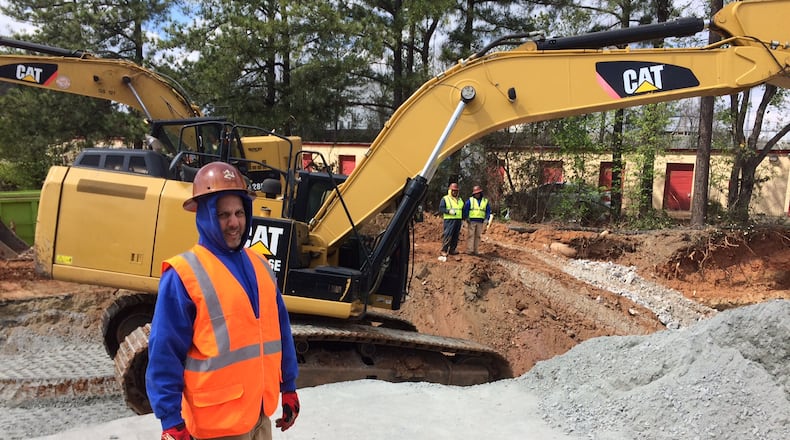I’ve always liked the underdog. You know, the dude who grabs his lance, jumps on his horse and takes off after that darned windmill.
They say you can’t fight City Hall. But I appreciate the hard-headed folks who never got the memo.
So meet Alessandro Salvo, who for years has been fighting The Man and has, oddly enough, figured out how to keep working for him.
In fact, he’s kind of Don Quixote in a hardhat and reflective vest.
This time Salvo is battling the city of Atlanta while trying to get water line construction work from it. That might sound like a convoluted way to do business — you know, you catch more flies with honey than vinegar. But who likes flies anyway?
I’ve written about Salvo before. In 2011 in DeKalb County, he and his dad wore wires to help the feds scoop up a couple of dirty inspectors who tried shaking them down on a job.
A year later, DeKalb officials put the kibosh on a contract to install water lines, even though Salvo was the low bidder by $270,000. He sensed retaliation, but the procurement director at the time said Salvo was being bounced on a technicality. (That contract director was later known as “unindicted co-conspirator” in another scandal.)
Salvo complained loudly and legally, and a DeKalb judge agreed, giving him the contract.
In 2015, much of DeKalb was out of water after a 48-inch main burst. Salvo went out and corked the geyser, but the county blamed him because, well, because strange stuff happens in DeKalb.
Last year, another massive water break left the county dry, and I found Salvo and his crew — again — at the site repairing the mess. He said he now had a multimillion-dollar annual contract with DeKalb to replace its aging water lines and to respond to emergencies. Turns out Quixote is not only hard-headed, but he does good work.
Now Salvo’s company, the 50-employee GS Construction, wants to work with Atlanta.
Last year, GS bid to replace sewer lines in Atlanta. GS was the low bidder at $19,319,250. The next lowest was Layne-T&J at $21,282,822 — or nearly $2 million more. But it turns out GS didn’t fill out a couple of forms in the bid after being told by their bonding company the forms were not needed. The contract went to Layne, at a cost to taxpayers.
Salvo appealed but Atlanta hearing officer George Maynard denied it, writing that “a municipality has discretion in the competitive bidding process.”
Maynard added, “Appellant did not present compelling evidence that the Interim Chief Procurement Office’s denial of the protest of Appellant was not in the best interest of the city.”
It might seem that saving $2 million might be “in the best interest of the city.”
Undeterred, Salvo went for a second Atlanta contract, one similar to his DeKalb gig replacing water lines.
His company’s bid was about $19.1 million, nearly $700,000 lower than Reeves Young Construction, a big Atlanta firm.
This time, GS was turned down for not listing that two supervisors had licenses. It turns out that several people at GS have such licenses and Salvo showed them to the city after learning his company lost the bid. But alas, the technicality will cost Atlanta water users $700,000, and maybe more, if the contract goes forward.
The circumstances sound similar to the facts in a 2006 state Supreme Court decision, R.D. Brown Contractors v. Board of Education of Columbia County. In that case, the low bidder did not include subcontractors on its bid proposal, was denied the contract, but ultimately was given the job when it showed the paperwork.
Governments can “waive technicalities,” the court said, adding: “The bid process … was designed to protect the public coffers from waste and to assure taxpayers receive quality work and goods for the lowest possible price.”
This week, Salvo told me, “This is the second time they threw us out in a ridiculous technicality. There is no such thing as a perfect bid. You can nitpick any of them.
“It seems their first duty is to protect the taxpayers’ money. Not to insist that every box is checked perfectly.”
Salvo says he’s not backing down. He has hired a lawyer, Mike Egan, who said, “The point of the law is to favor the low bidder. You don’t want to create artificial barriers.”
Egan pointed out that Salvo and his father wore wires for the FBI after getting approached in DeKalb. "They are really looking for integrity in contracting," Egan said. "The city of Atlanta should want that."
The city hearing officer will hear Salvo’s appeal next week. The mayor’s office says it won’t comment on the case because it is pending.
I spoke with lawyer Matt Maguire, who has battled Atlanta in contracting and has written about fighting the city.
"The City of Atlanta's Chief Procurement Officer testified in 2007 that he denied all 120-plus protests filed with him since he took office in 2002," Maguire wrote in an article telling contractors how to deal with governments. "Any protester having the audacity to appeal to the City-paid procurement appeals hearing officer met with the same fate. Thus, vendors protesting City of Atlanta procurement cannot expect any measure of relief until the dispute finally makes its way into the court system."
That Atlanta procurement officer he referred to? He’s in prison for taking bribes. Go figure.
I spoke with Maguire this week, several years after his written advice to contractors, and he seemed even more pessimistic. The city makes those who appeal put up a bond, he said, "so that when they deny you, not if, then they take out their attorney fees. I tell clients not to bother protesting; you'll waste your money."
In a recent letter to a city official, Salvo vowed he would bring this case to the Supreme Court if he had to.
Hey, Mr. Quixote, windmill ahead!
About the Author
The Latest
Featured





